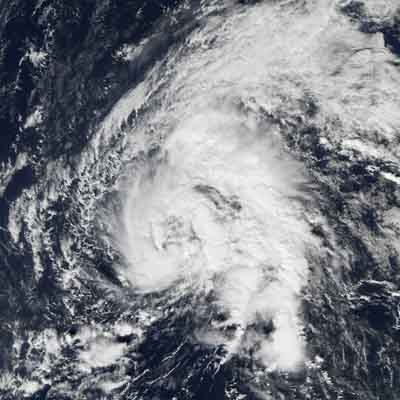 |
2005- Tropical Storm Zeta |
 |
Tropical Storm Zeta, the last storm of the 2005 Atlantic hurricane season, is one of only two recorded storms to cross from one calendar year to another (Tropical Storm Alice in 1954, was the first). Zeta developed abruptly from an upper-level low on December 28, 2005, about 1200 km (748 mi) west-northwest of the Cape Verde Islands. On December 29, thunderstorm activity had increased, and by midnight, the system was classified as a tropical depression. Only 6 hours later, on December 30, the system was upgraded to a tropical storm. Zeta would then spend about one week slowly moving over the subtropical waters of the central Atlantic, undergoing several cycles of strengthening, weakening, and reintensification. Zeta reached peak intensity with 102 km/h (64mph) winds on January 2 and then again on January 3.
By January 6, high-level wind shear caused the tropical cyclone to lose all deep convection. The system completely dissipated late on January 7, 2006, about 1065 km (660 mi) southeast of Bermuda. Tropical Storm Zeta never made landfall and no casualties or damage were reported. Only minor shipping problems occurred as a result of the storm.
 Tropical Storm Zeta on the 30th of December, 2005, as taken by the MODIS (Moderate Resolution Imaging Spectroradiometer) on NASA's Aqua Satellite. Source: NASA |
Fast Facts:
- The 2005 Atlantic hurricane season was the most active on record. As of October 19, 2005, all of the standard names had been exhausted, and meteorologists had to use the Greek alphabet to continue naming tropical cyclones. Zeta was the 27th storm of the 2005 Atlantic basin hurricane season, establishing the record for the most named storms in one year in that basin.
- Although Zeta did not impact land, it did interfere with the Atlantic Rowing Race of 2005, an ocean-rowing race spanning approximately 4700 km (2930 mi) from the Canary Islands to the West Indies. Not only did the active 2005 hurricane season cause a late-November start date for the race, but the storms later in the season produced prolonged spells of bad weather that made conditions unfavorable for rowing. Much of the fleet experienced high seas and adverse wind conditions as they passed through the southern edge of Tropical Storm Zeta in January. This bad weather all but prevented most crews from any attempt at a world record for the crossing.
|
 |


